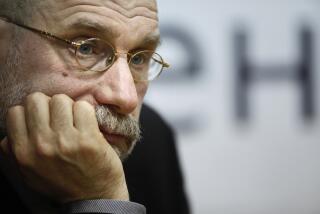Nuclear Whistle-Blower Vanunu Arrested in Israel
- Share via
JERUSALEM — Heavily armed police commandos Thursday stormed an Anglican Church compound in Jerusalem and arrested nuclear whistle-blower Mordechai Vanunu on suspicion of revealing classified information.
Vanunu, who served an 18-year prison sentence for treason and was released seven months ago, was taken before a magistrate, who ordered him confined to the church hostel under house arrest for seven days.
“This is a disgrace to Israeli democracy!” Vanunu shouted to journalists as he was led into court. “They want to punish me again. They cannot punish me twice. I suffered 18 years in prison. I have the right to be free.”
Analysts said the arrest of Vanunu -- who has repeatedly defied orders not to give interviews -- may be an Israeli attempt to suppress discussion of its nuclear program at a time of increasing international efforts to block Iran from developing nuclear weapons.
Israel has followed a policy of nuclear ambiguity, neither confirming nor denying it has nuclear weapons.
Vanunu was convicted in 1988 for divulging information and pictures of the Dimona reactor where he worked. The details, published in London’s Sunday Times, led experts to conclude that Israel has the world’s sixth-largest stockpile of nuclear weapons, including hundreds of warheads.
Vanunu, 49, was released from prison in April after spending much of his sentence in solitary confinement for disclosing those secrets.
On Thursday, about 20 police commandos wearing bulletproof vests and carrying machine guns burst into the walled compound of St. George’s Cathedral, where Vanunu had taken sanctuary upon his release, and arrested him as he ate breakfast.
Police ransacked Vanunu’s room and removed his computer and papers. Police spokesman Gil Kleiman declined to discuss what information Vanunu is suspected of revealing or to whom.
“In the 100 years of the cathedral’s history, such an event has never taken place,” Bishop Riah Abu El-Assal said in a letter to Anglican leaders.
“This type of entry into a sacred space must not be tolerated ... and we call for the respect of sacred places,” he wrote in the letter, which also was sent to Israeli Prime Minister Ariel Sharon.
A spokesman for Sharon, Raanan Gissin, dismissed the church protest, saying police had the right to search wherever necessary.
Vanunu has acknowledged violating his release arrangement, which barred him from meeting foreigners or discussing his work at Dimona, but he said he had no more classified information to reveal.
“I don’t have any secrets,” he said. “I cannot invent new secrets. Remember, these secrets are now 19 or 20 years old.”
More to Read
Sign up for Essential California
The most important California stories and recommendations in your inbox every morning.
You may occasionally receive promotional content from the Los Angeles Times.











